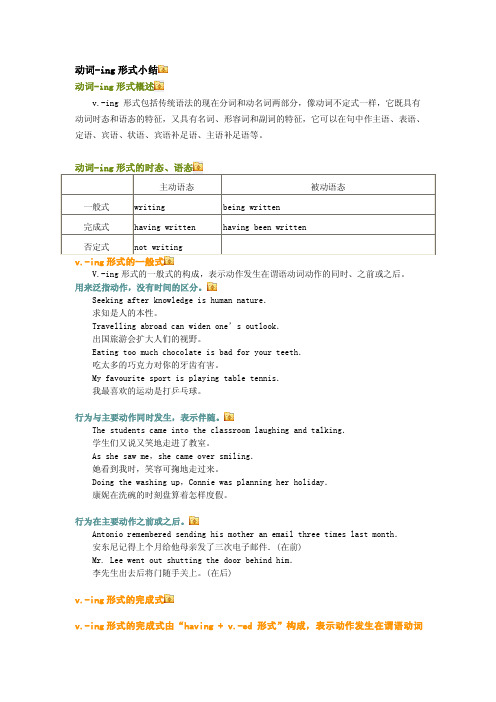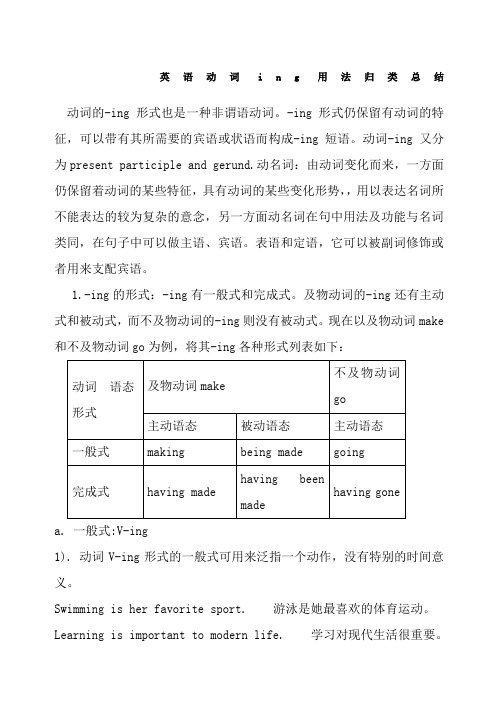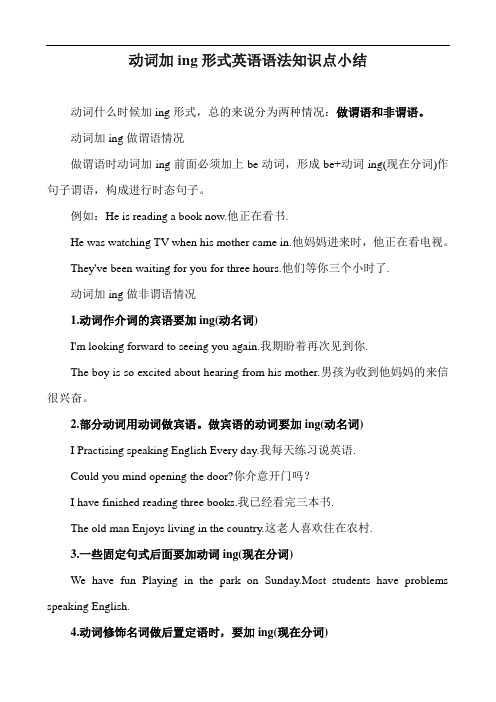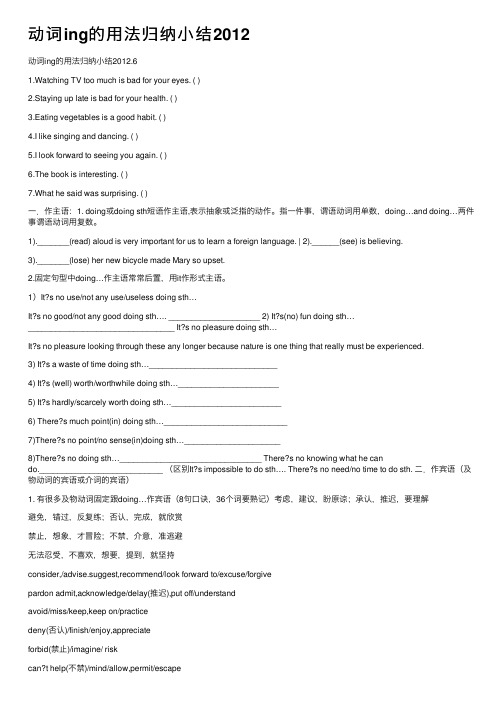动词ing小结
动词-ing形式小结

动词-ing形式小结动词-ing形式小结动词-ing形式概述v.-ing 形式包括传统语法的现在分词和动名词两部分,像动词不定式一样,它既具有动词时态和语态的特征,又具有名词、形容词和副词的特征,它可以在句中作主语、表语、定语、宾语、状语、宾语补足语、主语补足语等。
动词V.-ing形式的一般式表示1)动作发生在谓语动词动作的同时、之前或之后。
用来泛指动作,没有时间的区分。
Seeking after knowledge is human nature.求知是人的本性。
Travelling abroad can widen one’s outlook.出国旅游会扩大人们的视野。
Eating too much chocolate is bad for your teeth.吃太多的巧克力对你的牙齿有害。
My favourite sport is playing table tennis.我最喜欢的运动是打乒乓球。
2)行为与主要动作同时发生,表示伴随。
The students came into the classroom laughing and talking.学生们又说又笑地走进了教室。
As she saw me,she came over smiling.她看到我时,笑容可掬地走过来。
Doing the washing up,Connie was planning her holiday.康妮在洗碗的时刻盘算着怎样度假。
3)行为在主要动作之前或之后。
Antonio remembered sending his mother an email three times last month.安东尼记得上个月给他母亲发了三次电子邮件.(在前)Mr. Lee went out shutting the door behind him.李先生出去后将门随手关上。
(在后)v.-ing形式的完成式v.-ing形式的完成式由“having + v.-ed 形式”构成,表示动作发生在谓语动词表示的动作之前。
高考英语复习 专题05 动词的-ing形式 知识点归纳总结

高考英语复习专题05 动词的-ing形式知识点归纳总结动词的-ing形式包括传统语法的“动名词”(gerund)和“现在分词”(present participle)两个部分。
动词的-ing形式具有动词的特征,同时又具有名词、形容词和副词的特征,因此它可以在句中作主语、表语、定语、宾语、宾语补足语和状语。
一、动词-ing形式的特征和种类与动词不定式一样,动词的-ing形式也具有动词的特征,有时态和语态的变化,并可带状语、宾语等。
A.动词-ing形式的一般式1. 动词-ing形式的一般式可用来泛指一个动作,没有特别的时间意义。
Swimming is her favorite sport. 游泳是她最喜欢的体育运动。
Learning is important to modern life. 学习对现代生活很重要。
2. 动词-ing形式的一般式可用来表示和谓语动词同时发生的动作。
They went out of the classroom, talking and laughing. 他们有说有笑地走出教室。
She listened carefully to her neighbours speaking. 她倾听她邻居的讲话。
3. 动词-ing形式的一般式有时也可表示在谓语动词的动作之前或之后发生的动作。
I remembered sending him an e-mail last week. 我记得上星期给他发过一份电子邮件。
He suggested taking my daughter to the zoo the next Sunday. 他建议下个星期天带我女儿去动物园。
B. 动词-ing形式的完成式动词的-ing形式的完成式表示一个已完成的动作,这个动作发生或完成在谓语动词表示的动作之前。
Having lived in this city for three years, she knows it very well. 在这个城市生活了3年,她对这里已很熟悉。
动词-ing形式小结

-ing-ingv.-ingV.-ingSeeking after knowledge is human natureTravelling abroad can widen one's outlookEating too much chocolate is bad for your teethMy favourite sport is playing table tennisThe students came into the classroom laughing and talkingAs she saw meshe came over smilingDoing the washing upConnie was planning her holidayAntonio remembered sending his mother an email three times last month ()Mr.Lee went out shutting the door behind him()v.-ingv.-ing"having+v.-ed"Having finished his homeworkhe went to bed("""")He doesn't remember having promised me thatShe regretted having missed the filmI remember having heard you speak on that subjectI could not recall having heard anyone say that beforeThat weekendhaving watched TV to a whileI went to the library to borrow some new novelsHaving realized why he had failed in the examhe has made up his mind to work harder from now onThe decision having been madethe next problem was how to make a good plan v.-ingv.-ing"being+v.-ed"v.-ingWhat's the subject being discussed at the meeting??Being asked to answer the questionshe felt a little nervousThe large building being built(=which is being built)will be our school libraryThe highway being built will lead to Tanggu portI still remember being taken to Hangzhou when I was a childHe did it without being askedThis problem is far from being settledThe squirrel was luckyIt missed being caughtHe hated being laughed atHe narrowly missed being seriously injuredYou'll find the topic being discussed everywherev.-ing"having been+v.-ed"Having been given such a good chancehow could you not cherish it at all??Having been invitedhe went to Japan to attend the conferenceThe decision having been madethe next problem was how to make a good planv.-ingv.-ing not v.-ingThe boy made his father angry by not taking his medicineI regret not being able to help youNot having received an answerhe decided to write againNot knowing his address and telephone numberwe couldn't get in touch with himI'm sorry for not being present at your party in timeI felt sorry for not having done the work wellI'm sorry for not having telephoned you beforeShe hated herself for not having worked hardTrying without success is better than not trying at all-ingv.-ingSeeing is believing.()()Playing table tennis is his favourite sport.Crossing the Atlantic by plane takes only a few hours.Talking is easier than doing.it v.-ingIt's no use talking about itI don't think it's much good writing to him.It's no use crying over spilt milk()()v.-ingv.-ingv.-ing"There be no+v.-ing"There's joking about such mattersThere's no telling what he's going to do.No smokingNo parkingv.-ingTom's marrying Jenny made his father angryIt's no use your pretending that you didn't know the rulesHer going there won't do any harmv.-ingv.-ingv.-ing A v.-ing B.v.-ingA avoid consider delay dislike enjoy escape excuse finish giveup cannot help imagine include keep(on)mind miss practise put off suggest He enjoys listening to light musicThe young man is considering changing his jobI'm sorry I missed seeing you while in ShanghaiWould you mind filling out this form??My father gave up smoking last yearMother suggested going to Beijing by airB begin cannot bearceasecontinueforget hate likelovemean planpreferproposeregretrememberstartstoptrybegin start continue cease cannot bear hate like love prefer propose v.-ingThe students began writing/to write compositions.She cannot bear to be laughed at./being laughed at.The boys love to play/playing football.would likelovepreferhateI'd like to buy a motor carI'd prefer to walk this morningI'd hate to disappoint herHe's beginning to learn JapaneseWe're proposing to start at seven7begin seeunderstandknowbelieveShe began to understand she was wrongI began to believe what he saidbeginSuddenly it began to rainneedwantrequire v.-ingv.-ingMy recorder needswantsrequires mending./to be mended.His letter requires answering/to be answered immediately.rememberforgetregret v.-ingv.-ingI remember posting the letter("""")I must remember to post the letter("""'')I've forgotten returning the book to the library("")I've forgotten to return the book to the library("")trycannot help,mean,stopgo on v.-ingThey stopped to talk.()()They stopped talking(v.-ing)He tried to do the work better.He tried doing the work in another way.Do you mean to tell me that??That'll mean waiting for some more timeI couldn't help to finish that job.I couldn't help laughing when I heard the news.He went on to point out mistakes in the paper.() He went on pointing out mistakes in the paper.()(1)it v.-ing v.-ingShe found it no use arguing with himDo you consider it any good trying again??(2)v.-ing(finish practise)v.-ing()Do you mind me(my)smoking??We are considering him(his)going therev.-ingAfter winning the competitionshe was ranked first in the world in women's figure skatingAt last he succeeded in performing his taskHis Job consists of gathering information and writing articlesI'm surprised at finding the house emptyI'm sorry for giving you so much troubleHowWhat about going to the cinema??Nothing can stop them from falling in love with each otherTom is angry about not being invited to the partyWe had no trouble in finding his houseI'm glad to have this opportunity of coming to visit your countryEveryone thinks of changing the worldbut no one thinks of changing himselfv.-ingI heard him singing a popular song in the next roomWe can see steam rising from the wet clothes1fee find get hear keep see watch notice v.-ingHe was heard singing a popular song in the next roomSteam can be seen rising from the wet clothes2v.-ingv.-ingI saw her come in("")I saw her coming in("")v.-ingMy favourite sport is playing table tennis.What interests me is living and dying for what one lovesReading is learningv.-inlgv.-ing(v.-ing )Their job is building houses.Our task now is to build a housev.-ingThere's a swimming pool in our school(a swimming pool a pool for swimming)He is in the reading room.(the reading room the room for reading)v.-ingv.-inga sleepingbaby=a baby who is sleepingsleeping v.-ing babya runningriver=a river that is runninga waitingcara flyingfisha barkingdoga cleaningwomana sleepingvolcanoa firingsquadan astonishingspeeda touchingstorya shiningexamplean everlastingfriendshipv.-ingrolling waves falling leaves galloping horses coming week touching story rising sun ruling clique striking contrast raging flames biting windv.-inga hard-working Chinese peoplefar-reaching significancehigh-sounding wordsan ocean-going destroyeran easy-going manthe theatre-going publicearth-shaking changesepoch-making eventv.-ingv.-ingv.-ingAsleeping car=a car for sleeping aswimming pool=a pool for swimming areading room=a room for reading aliving room=a room for living atyping paper=a paper for typing awriting desk=a desk for writingv.-ingv.-ingrunning shoesstudying methodwaiting roomdriving permitreading materialssmoking roomdancing hallworking hoursv.-ing v.-ing Caring mothers know that brain needs extra nutritionA diet lacking in nutritional value won't keep a person healthyThere were a lot of boy students playing football on the football fieldv.-ingHe sat there smoking()She stood on the beachgazing at the ocean()Watching(=When he watched)an apple falling down from the tree Newton had an inspiration()Looking down from the top of a cliffyou will feel dizzy()Not having received an answerhe decided to write again()In1492Columbus commanded a small fleet across the Atlanlic Ocean searching for a sea route to Asia1492()Water can absorb and release a lot of heat without big changes in its tem-peraturethus creating a stable environment()v.-ingv.-ingThe room should be given a good cleaningWho did the recording??I'll do some shoppingreading this afternoon()Please send our greetings to themv.-ingv.-ingSeeing is believing.()My favourite sport is swimming.This is not saying very much.I think that's putting it rather mildly.v.-ingv.-ing v.-ingamusing,annoying,boring, charming,comforting,confusing,disappointing,discouraging,disturbing, embarrassing,encouraging,exciting,fascinating,interesting,inviting,missing, misleading,obliging,pleasing,pressing,promising,puzzling,refreshing, shocking,striking,surprising,vexingv.-ingPrices are stable and the market is flourishing.It's boring sitting at home with nobody to talk to.I suppose it's a bit embarrassing.The flowers look even more charming after the rain.v.-ing v.-ingHis hobby is collecting stamps.He is collecting stamps.The present situation is encouraging.The present situation is encouraging the people all over the world in their fight against hegemonism.go fishing v.-inggo,come sit,stand v.-ing( )Jim's gone fishing.She came running to meet me.We sat telling stories to the children.He stood watching the soccer match.v.-ingv.-ing v.-ingv.-ingv.-ing v.-ingWe consider meeting her foolish.we consider it foolish meeting her.We consider it foolish to meet her.v.-ingv.-ingacknowledge,avoid,consider,contemplate,defer,delay,dislike,enjoy, escape,excuse,evadefacilitate,fancyfavourfinish,give up,cannot help, imagine,include,keep(on),don't mind,misspostponepractiseput off,resent, resist,risk,cannot stand,suggest1Peter received a letter just now________his grandma would come to see him soonAsaid B says Csaying D.to say2.--Come onplease give me some ideas about the project.--SorryWith so much work________my mindI almost break down.Afilled B filling Cto fill D being filled3.--Do you think that housing price will keep________in the years to come?--SorryI have no ideaA.lifting up Bgoing up Cbringing up Dgrowing up4As the light turned green I stood for a moment not________,and asked myself what Iwas going to doAmoved B moving Cto move Dbeing moved5.We often provide our children with toysfootballs or basketballs________ that allchildren like these thingsAthinking Bthink Cto think Dthought6The wild flowers looked like a soft orange blanket________the desert Acovering Bcovered Ccover Dto cover7If you think that treating a woman well means always________her permission forthingsthink againAgets Bgot Cto get Dgetting8After he became conscioushe remembered________and________on the head with a rodAto attackhit Bto be attackedto be hitCattackingbe hit Dhaving been attackedhit9Don't sit there________nothingCome and help me with this tableAdo Bto do Cdoing D.and doing10My cousin came to see me from the country________me a full basket of fresh fruitsAbrought Bbringing Cto bring Dhad brought11Whenever he was asked why he was late for classhe would answer carelessly always________the same thingAsaying Bsaid Cto say Dhaving said12--There is a story here in the paper about a110-year-old man --My goodness!I can't imagine________that oldAto be Bto have been Cbeing Dhaving been13It is difficult to imagine his________the decision without any considerationAaccept Baccepting Cto accept Daccepted14I was told that there were about50foreign students________Chinese in the schoolmost were from GermanyAstudyof whom Bstudyof themCstudyingof them Dstudyingof whom15When________different cultureswe often pay attention only to the differenceswithout noticing the many similaritiesAcompared Bbeing comparedCcomparing Dhaving compared1C received AB v.-ingv.-ingC2B with withADv.-ingB""3B keep v.-ing""lift up go up bringup grow up Bhousing price B4B v.-ing v.-ingstoodv.-ing moving 5Av.-ing think v.-ing6Av.-ing blanket coverlike v.-ing7Dmean doing sth""mean to do sth" "8D After he became conscious remember doing" "()having been attacked andhit attack hit v.-ed hit9Cv.-ing10Bv.-ing""v.-ing v.-edcame D11Av.-ing he v.-ingBandC D12Cimagine v.-ing""" "13B imagine v.-ing enjoyappreciate insist on14D v.-ing D5015C"when+v.-ing" v.-ingwecomparev.-ing。
动词ing形式总结

课文应用
dancing (跳舞) 是由动词dance去掉字母e加ing变化而来。
第一类
一般动词直接在词尾加ing, 例如: read → reading (读) talk → talking (交谈) sing → singing (唱歌) study → studying (学习)
第二类
以不发音的字母e结尾的动词, 去e, 再加ing, 例如:
write → writing (写) skate → skating(滑冰) ride → riding (骑)
drive → driving (学习)
第三类
以重读闭音节结尾且末尾只有一个辅音字母的动词, 双写这个辅音字母后,再加ing, 例如:
die → dying死 tie → tying系,捆绑
即学即练
say → saying
speak → speaking
make → making come → coming
swdying
tie → tying
口诀记忆
动词-ing 很好记, 一般情况直接加ing。 词尾若有哑音 e , 去 e 再加 ing。 “一辅重闭” 作尾巴,双写后加ing。 还有一些要注意,改ie 为 y 再加 ing。
sit → sitting 坐(坐) run → running跑(跑) cut → cutting切(,切割,割) get → getting 得(得到到) stop → stopping 停(停)
第四类
少数几个以 ie 结尾的动词,变 ie 为 y , 再加ing, 例如:
lie → lying 躺,撒谎
英语动词ing的用法总结

英语动词ing的用法总结
1. 作为动词的进行时态,表示正在进行或进行中的动作。
例如:I am studying English.(我正在学习英语。
)
2. 作为名词,表示一种行为或状态。
例如:Swimming is my favorite sport.(游泳是我最喜欢的运动。
)
3. 作为形容词,表示引起动作或状态的物体或事物。
例如:The running water is very cold.(流动的水很冷。
)
4. 作为分词形式,构成现在分词和过去分词。
现在分词表示主动或进行的动作,常用于进行时态和作定语。
过去分词表示被动或完成的动作,常用于被动语态或完成时态。
例如:The girl is singing.(这个女孩正在唱歌。
)
The broken window needs to be fixed.(这个破窗户需要修理。
)
5. 和某些动词连用构成特定的短语动词,具有特定的意义。
例如:go swimming(去游泳)、keep doing(一直做某事)、enjoy reading(喜欢阅读)
6. 在某些固定词组中作为名词或形容词。
例如:a running nose(流鼻涕)、a burning desire(炙热的渴望)。
动词ing用法归类总结好

英语动词i n g用法归类总结动词的-ing形式也是一种非谓语动词。
-ing形式仍保留有动词的特征,可以带有其所需要的宾语或状语而构成-ing短语。
动词-ing 又分为present participle and gerund.动名词:由动词变化而来,一方面仍保留着动词的某些特征,具有动词的某些变化形势,,用以表达名词所不能表达的较为复杂的意念,另一方面动名词在句中用法及功能与名词类同,在句子中可以做主语、宾语。
表语和定语,它可以被副词修饰或者用来支配宾语。
1.-ing的形式:-ing有一般式和完成式。
及物动词的-ing还有主动式和被动式,而不及物动词的-ing则没有被动式。
现在以及物动词make 和不及物动词go为例,将其-ing各种形式列表如下:a. 一般式:V-ing1). 动词V-ing形式的一般式可用来泛指一个动作,没有特别的时间意义。
Swimming is her favorite sport. 游泳是她最喜欢的体育运动。
Learning is important to modern life. 学习对现代生活很重要。
2). 动词V-ing形式的一般式可用来表示与谓语动词同时发生的动作。
They went out of the classroom, talking and laughing. 他们有说有笑地走出教室。
3). 动词V-ing形式的一般式有时也可表示在谓语动词的动作之前或之后发生的动作。
I remembered sending him an e-mail last week. 我记得上星期给他发过一份电子邮件。
He suggested taking my daughter to the zoo the next Sunday.他建议下个星期天带我女儿去动物园。
?b.完成式: having done1.动词V-ing形式的完成式表示一个已完成的动作,这个动作发生或完成在谓语动词表示的动作之前。
动词ing的用法总结

2. -ing形式的否定式
其基本结构是:not + -ing形式无论在完成式还是 被动式里not必须置于-ing形式之前如:
Not having finished his homework the boy was still doing it in the classroom.
3. -ing形式短语的功能有时相当于一个状 语从句
表动作同时发生
1.分词短语作状语时其逻辑主语必须与句子的主 语一致如果不一致必须用独立主格结构来表示也 就是在分词前面加上它的逻辑主语
1. Comparing all the great people with each other you’ll find that they have much in common.
C. stop/ go on stop to do 另一件 stop doing 同一件
D. need/ want/ require The flowers need watering. Doing 用主动 The flowers need to be watered. to be done用被动
laying eggs.
was
very
interesting.
=Laying eggs is her full-time job.
≠Interesting was the story he told us.
作宾语
1.只接动名词的动词:
避免错过少延期 avoid/ miss/ delay/ postpone 建议完成多练习 suggest/advise/finish/complete/ practice
1 Having written the letter John went to the post office.
动词加ing形式英语语法知识点小结

动词加ing形式英语语法知识点小结动词什么时候加ing形式,总的来说分为两种情况:做谓语和非谓语。
动词加ing做谓语情况做谓语时动词加ing前面必须加上be动词,形成be+动词ing(现在分词)作句子谓语,构成进行时态句子。
例如:He is reading a book now.他正在看书.He was watching TV when his mother came in.他妈妈进来时,他正在看电视。
They've been waiting for you for three hours.他们等你三个小时了.动词加ing做非谓语情况1.动词作介词的宾语要加ing(动名词)I'm looking forward to seeing you again.我期盼着再次见到你.The boy is so excited about hearing from his mother.男孩为收到他妈妈的来信很兴奋。
2.部分动词用动词做宾语。
做宾语的动词要加ing(动名词)I Practising speaking English Every day.我每天练习说英语.Could you mind opening the door?你介意开门吗?I have finished reading three books.我已经看完三本书.The old man Enjoys living in the country.这老人喜欢住在农村.3.一些固定句式后面要加动词ing(现在分词)We have fun Playing in the park on Sunday.Most students have problems speaking English.4.动词修饰名词做后置定语时,要加ing(现在分词)There is a boy Crying over there.I felt something moving in the house.I heard someone singing in the next room.5.动词做主语和表语时,动词要加ing(动名词)Swimming is very popular in summer.His job is teaching English.综上所述,动词在以上六种情况需要加ing!增强背诵记忆的方法• 勤动手指锻炼手指功能可健脑益智,促进思维。
非谓语动词 V-ING用法小结附练习

动词的ing形式作表语,定语,宾补和状语一、动词-ing形式作表语1. 表示主语的内容,可以转换到句首作主语Her job is keeping the lecture hall as clean as possible. (= keeping the lecture hall as clean as possible is her job)她的工作是尽量使报告厅保持干净。
2. 表示主语具有的特征、性质和状态(动词ing 相当一个形容词)The problem is quite puzzling.这个问题很令困惑。
3.常用来作表语的现在分词有astonishing, amusing, confusing, disappointing, boring, encouraging, inspiring, moving, tiring, interesting, surprising等。
全析提示:动词-ing形式作表语时,其逻辑主语往往是句子中的主语,但用作表语的-ing形式也可带有自己的逻辑主语。
What worries me most is her staying too late every night. (staying too late every night的逻辑主语是her)二、动词-ing形式作定语1 单个的动词-ing形式可以作前置定语,一般具有两种含义。
①说明被修饰名词的用途和性能。
a reading room = a room which is used for reading 阅览室running shoes =shoes for running 跑鞋a working method =a method for working 工作方法②表示所修饰的人或物的动作或状态,在意思上接近一个定语从句,可以表示正在进行的动作,也可表示经常性动作或当时的状态。
developing countries = countries that are developing发展中国家an ordinary-looking house = a house that looks ordinary看起来很普通的房子a puzzling problem = a problem that puzzles somebody困扰人的问题2 作定语的动词-ing形式如是一个短语,则应放在被修饰词的后面,做后置定语,相当于一个定语从句。
动词ing知识点总结

动词ing知识点总结动词ing形式,在英文语法中是一种非常重要的形式,它有多种不同的用法和功能。
在本篇文章中,我们将深入探讨动词ing形式的各种用法和知识点,帮助读者更好地掌握和使用这一语法结构。
一、动词ing形式的基本构成动词ing形式的构成非常简单,大多数情况下是在动词原形的基础上加上ing后缀。
例如:- walk → walking- eat → eating- play → playing但是也有一些特殊的变化规则,比如以“e”结尾的动词要去掉最后的“e”再加上ing,比如:- take → taking- make → making- write → writing还有一些以辅音字母加“ie”结尾的动词,要将“ie”变为“y”再加上ing,比如:- die → dying- lie → lying总的来说,动词ing形式的构成规则比较简单,但需要注意一些特殊变化规则。
二、动词ing的用法动词ing形式具有多种不同的用法和功能,下面将详细介绍每一种用法。
1. 动词ing 作谓语动词动词ing形式可以作为谓语动词,表示正在进行的动作。
例如:- He is reading a book.- They are playing basketball.2. 动词ing 作动名词动词ing形式也可以作为名词使用,这就是动名词。
动名词可以作为主语、宾语、表语、介词宾语等。
例如:- Swimming is good exercise.- I enjoy reading novels.- She is good at singing.3. 动词ing 作形容词动词ing形式还可以作为形容词使用,表示给人或物的特征或状态。
例如:- The movie was boring.- The running water sounds soothing.4. 动词ing 用于进行时态在进行时态中,动词ing形式表示正在进行的动作。
动词ing的用法总结

V-ing
doing
having done
表动作有先有后
表动作同时发生
一般式
完成式
1.分词(短语)作状语时,其逻辑主语必须与句子的主语一致。如果不一致,必须用独立主格结构来表示,也就是在分词前面加上它的逻辑主语。
1. Comparing all the great people with each other, you’ll find that they have much in common. 2. Finding her car stolen, sr help. 3. The train having gone, we had to wait another day.
5
3.意义不一致
remember/ forget/ regret
C. stop/ go on stop to do 另一件 stop doing 同一件
D. need/ want/ require
The flowers need watering.
Doing 用主动
The flowers need to be watered. to be done用被动
作定语
China is a developing country.
a sleeping boy= a boy who is sleeping
现在分词作定语表示动作。如果是单词,放在被修饰的名词前;如果是短语,放就放在被修饰的名词之后。
a developing country = a country which is developing
Seeing from the hill, you can get the whole town.(条件)
初中英语动词ing-用法小结

初中英语动词ing用法小结[导读]动词finish,mind,enjoy,practise,keep等后接动词,要用动名词形式作宾语。
在英语教学中,我发现考动词-ing形式的题目很多。
根据多年教学经验,现在把初中阶段-i n g 的情况总:一、一些动词后要接动名词作宾语1.Everyoneenjoys____(watch)TVintheevening.2.Pleasefinish____(draw)thepictureafterschool.3.Thestudentspractise____(read)Englisheverymorning.【解析】动词finish,mind,enjoy,practise,keep,miss,hate,consider,continue,Imagine,suggest,advise等后接动词,要用动名词形式作宾语。
答案是:watching;drawing;reading.二、一些介词后面要加动名词作宾语1.Heisgoodat____(write).2.Wearelookingforwardto____(see)you.3.Theyareinterestedin____(listen)tomusic.4.Youcandrinkalotofwaterwithout____(get)fat.【解析】介词后跟动词,要用动名词形式作其宾语。
如下列结构中的介词:thanksfor doingsth,thinkaboutdoing,begoodatdoingsth,dowellindoingsth,succeedindoing,How/Whataboutdoingsth?,insteadofdoingsth,keepsbfromdoingsth,stopsb fromdoingsth,lookforwardtodoingsth,beusedto(习惯于)doingsth,devotetodoingsth,payattentiontodoing,preferdoingtodoing,makeacontribution(贡献)todoingsth答案是:writing;seeing;listening;getting.三、一些固定结构要加动词的ing形式1.Hespendshalfanhour____(do)hishomeworkeveryday.2.Theyarebusy____(prepare)forthecomingtest.3.Wehaveagreattime____(talk)toeachtimeatlunchtime.【解析】在一些固定结构中要求使用动词-ing形式。
动词ing的用法归纳小结2012

动词ing的⽤法归纳⼩结2012动词ing的⽤法归纳⼩结2012.61.Watching TV too much is bad for your eyes. ( )2.Staying up late is bad for your health. ( )3.Eating vegetables is a good habit. ( )4.I like singing and dancing. ( )5.I look forward to seeing you again. ( )6.The book is interesting. ( )7.What he said was surprising. ( )⼀.作主语:1. doing或doing sth短语作主语,表⽰抽象或泛指的动作。
指⼀件事,谓语动词⽤单数,doing…and doing…两件事谓语动词⽤复数。
1)._______(read) aloud is very important for us to learn a foreign language. | 2).______(see) is believing.3)._______(lose) her new bicycle made Mary so upset.2.固定句型中doing…作主语常常后置,⽤it作形式主语。
1)It?s no use/not any use/useless doing sth…It?s no good/not any good doing sth…. ____________________ 2) It?s(no) fun doing sth…________________________________ It?s no pleasure doing sth…It?s no pleasure looking through these any longer because nature is one thing that really must be experienced.3) It?s a waste of time doing sth…____________________________4) It?s (well) worth/worthwhile doing sth…______________________5) It?s hardly/scarcely worth doing sth…________________________6) There?s much point(in) doing sth…___________________________7)There?s no point/no sense(in)doing sth…_____________________8)There?s no doing sth…_______________________________ There?s no knowing what he cando.___________________________ (区别It?s impossible to do sth…. There?s no need/no time to do sth. ⼆.作宾语(及物动词的宾语或介词的宾语)1. 有很多及物动词固定跟doing…作宾语(8句⼝诀,36个词要熟记)考虑,建议,盼原谅;承认,推迟,要理解避免,错过,反复练;否认,完成,就欣赏禁⽌,想象,才冒险;不禁,介意,准逃避⽆法忍受,不喜欢,想要,提到,就坚持consider,/advise.suggest,recommend/look forward to/excuse/forgivepardon admit,acknowledge/delay(推迟),put off/understandavoid/miss/keep,keep on/practicedeny(否认)/finish/enjoy,appreciateforbid(禁⽌)/imagine/ riskcan?t help(不禁)/mind/allow,permit/escapecan?t stand(⽆法忍受)/dislikefeel like/mention /insist on2. ⼈+ want/need/require to do sth…(⼈/物deserve doing sth 应得…物+ want/need/require doing sth…to be done sth…I want/need/require____________(have) a rest.My hair wants/needs/requires___________(cut)The window needs____________(clean).Your trousers need____________(wash)3. 固定词组及句型结构中的doing…waste/spend…时间、⾦钱…on sth/ (in)doing sth_________________ have difficulty/trouble/a hard time(in) doingsth_________________ have a good time/fun(in) doing sth____________________________ lose no time(in) doing sth_____________________________ be occupied in doing sth ______________________________ be busy doing sth_________________________4. ⼏组易混淆的搭配区别:regret doing sth_____________ regret to do sth_____________ forget doing sth_____________ forget to dosth_____________ remember doing sth__________ remember to do sth__________ stop doing sth_______________ stop to do sth_______________ mean doing sth_____________ mean to do sth_____________ try doing sth ____________ try to do sth_____________be used to doing sth_______be used to do sth__________used to do sth___________ go on doing sth____________ go on to do sth____________ can?t help doing___________ can?t help to do sth________ consider doing sth consider to do sth但是(1)like/love/prefer/hate/begin/start/continue/intend等+do/to do sth 基本没什么意义上的差别。
有关ing知识点总结

有关ing知识点总结一、ing的基本用法ing是一个非常常见的词尾,在英语中用来构成动名词和现在分词。
动名词表示的是动作的持续性或正在进行性,常用来作主语、宾语或介词宾语。
现在分词是一种形容词,用来修饰名词或代词,表示状态或特征。
1. 动名词的构成动名词的构成规则是在动词原形的基础上加上-ing。
例如:read → reading,write → writing,study → studying。
2. 动名词的用法a. 主语:Reading is my favorite hobby.b. 宾语:I like reading books.c. 介词宾语:I am good at singing.3. 现在分词的构成现在分词的构成规则也是在动词原形的基础上加上-ing。
例如:play → playing,dance → dancing,swim → swimming。
4. 现在分词的用法a. 修饰名词:The crying baby needs attention.b. 修饰代词:I saw him running in the park.二、ing的时态用法ing形式的动词可以表示进行时或完成时,具体的时态和语态要根据上下文确定。
1. 进行时进行时表示某一动作或状态正在进行中,通常用于现在进行时和过去进行时。
a. 现在进行时:I am reading a book.b. 过去进行时:She was studying when I called her.2. 完成时完成时用于表示一个已经完成的动作或状态,通常用于现在完成进行时和过去完成进行时。
a. 现在完成进行时:She has been working here for 5 years.b. 过去完成进行时:I had been studying for 2 hours when he came back.三、ing的被动语态ing形式的动词也可以构成被动语态,形式为be + being + 过去分词。
